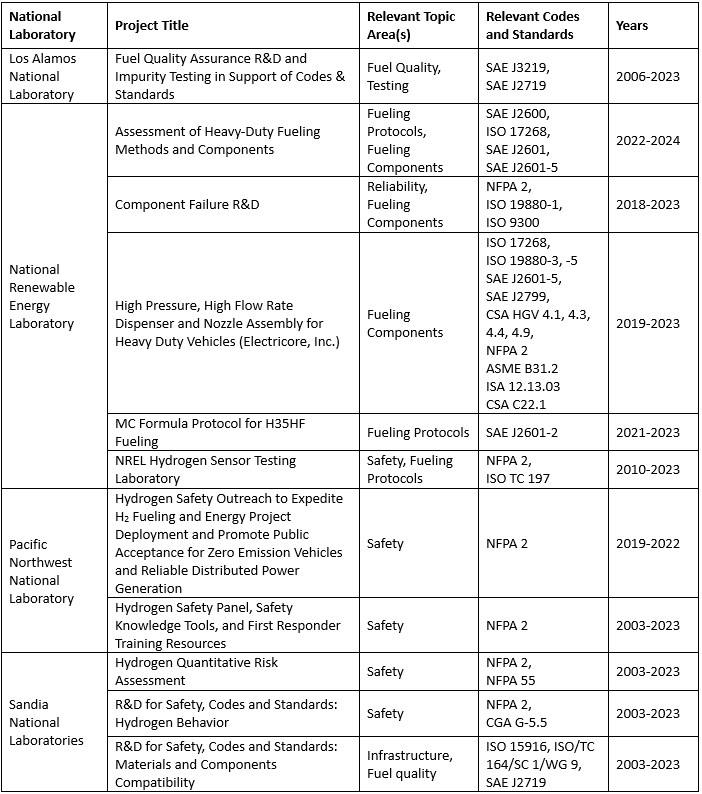Hydrogen Fueling Standardization Activities
Hydrogen Fuel Cell Partnership : is a collaboration between 71 companies, academic institutions, and government agencies focused on the advancement of FCEV and hydrogen station deployment through stakeholder engagement and collaboration (California Fuel Cell Partnership, n.d.).
Consortium of Hyundai, Toyota, Nel, NIKOLA, Air Liquide, and Shell:the goal is to develop and standardize MD/HD-FCEV hydrogen inlet receptacle, dispenser hose, breakaway, and nozzle (Hyundai, n.d.).
HyConnect : led by Shell, Bosch, and Hochschule Aalen (University of Applied Science) with support from other OEMs. The goal is to develop advanced communications for fueling MD/HD-FCEVs (Shell TechWorks, n.d.).
Japan Hydrogen Association (JH2A) : consists of over 80 companies and focuses on the areas of hydrogen research, development of a global hydrogen supply chain, and policy (Chris Randall, 2020).
Clean Hydrogen Joint Undertaking, previously the Fuel Cells and Hydrogen Joint Undertaking: : public-private partnership under the Europe Union, which developed a heavy-duty vehicle hydrogen fueling protocol under the PRHYDE project, concluded in 2022 (Horizon 2020 European Union Funding for Research and Innovation, 2023). The goals of this project were to (1) collect information on anticipated MD/HDV hydrogen on-board storage requirements; scope of existing MD/HDV fueling protocols, and if applicable identify any gaps; anticipated requirements for future fueling protocols; and existing fueling hardware, and if applicable, identify development gaps and (2) define future fueling protocol with high performance (Horizon 2020 European Union Funding for Research and Innovation, 2023).
The U.S. Department of Energy’s National Laboratories are conducting several research projects within the areas of hydrogen safety, codes, and standards related to MD/HD-ZEV infrastructure standardization. Table 1 presents a summary of relevant U.S. DOE projects from the 2022 Hydrogen Annual Merit Review. Current programs are eligible for renewal on an annual basis (U.S. DOE Hydrogen Program, n.d.).
Table 1 – U.S. Department of Energy Funded Hydrogen Projects related to Hydrogen Safety, Codes, and Standards for MD/HD-ZEV Infrastructure

California Fuel Cell Partnership. (n.d.). Retrieved July 28, 2022, from https://cafcp.org/
Chris Randall. (2020, October 14). Japanese industry prepares launch of hydrogen alliance . Electricdrive. https://www.electrive.com/2020/10/14/japanese-industry-prepares-launch-of-hydrogen-alliance/
Horizon 2020 European Union Funding for Research and Innovation. (2023). PRHYDE Results as Input for Standardisation.
Hyundai. (n.d.). Hydrogen Heavy Duty Vehicle Industry Group Partners to Standardize Hydrogen Refueling, Bringing Hydrogen Closer to Wide Scale Adoption. Retrieved July 28, 2022, from https://www.hyundai.com/worldwide/en/company/newsroom/hydrogen-heavy-duty-vehicle-industry-group-partners-to-standardize-hydrogen-refueling%252C-bringing-hydrogen-closer-to-wide-scale-adoption-0000016734
Iborra, A., Gupta, E., & Seissler, L. (2016). 4th International Workshop on Hydrogen Infrastructure and Transportation. In Conference Report by Joint Research Centre (JRC), the European Commission. https://doi.org/10.2790/06946
Shell TechWorks. (n.d.). HyConnect-Wireless Communication Between H2 Vehicles and Dispensers,. Retrieved July 28, 2022, from https://cleanenergypartnership.de/wp-content/uploads/2022/03/CEP_workshop_HyConnect_ShellTechWorks_Day1_FINAL-1.pdf
U.S. DOE Hydrogen Program. (n.d.). Annual Merit Review Presentation Database. Retrieved October 10, 2022, from https://www.hydrogen.energy.gov/amr-presentation-database.html
